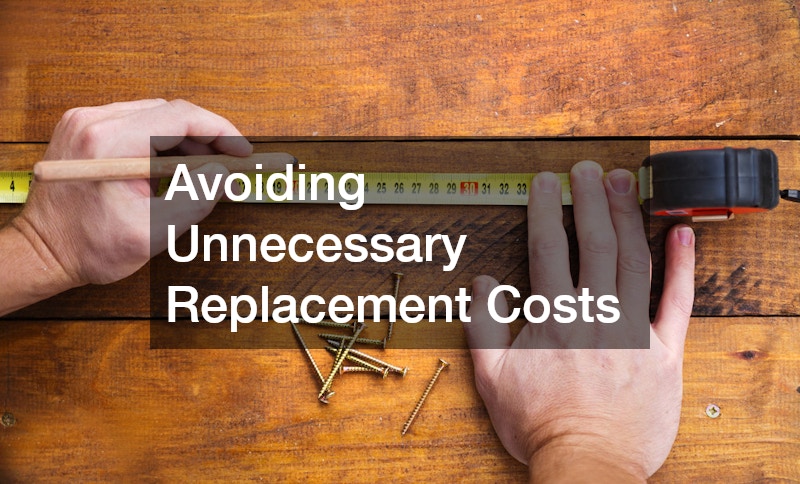Recognizing The Need for Planned Maintenance
Homeownership is one of life’s most rewarding investments, but it also comes with a continuous set of responsibilities. While most people expect to handle the occasional home improvement project or appliance upgrade, many overlook the significant financial impact that reactive maintenance can have over time. Unanticipated repairs—especially those related to major systems like plumbing, roofing, or HVAC—can cost thousands of dollars and arrive without warning. These unexpected costs can place a heavy strain on household budgets, often forcing homeowners to make quick decisions under pressure. That’s where home maintenance plans can truly shine, helping to minimize financial surprises by organizing care into a predictable schedule.
Instead of waiting for something to break or fail, home maintenance plans give homeowners the tools to act before problems arise. These plans typically include regular inspections, service checks, and preventative care across a variety of home systems. The idea is to treat maintenance as an ongoing process rather than a reaction to failure. By investing in a comprehensive plan, homeowners gain a structured roadmap for keeping their home in peak condition, extending the life of its components, and reducing the need for urgent interventions. Not only does this save money over time, but it also creates peace of mind, knowing that your property is being cared for proactively.

Reducing the Risk of Costly Repairs
One of the most effective ways home maintenance plans help save money is by minimizing the likelihood of high-cost repairs. Homes contain many interconnected systems that can suffer from wear and tear, and when one part fails, it often leads to a cascade of other problems. For example, a small crack in a pipe or an unsealed window can eventually lead to water damage, mold growth, or foundational instability. These issues, if left untreated, can cost thousands to fix—far more than the price of routine maintenance. Home maintenance plans are designed to catch these problems while they’re still manageable, allowing homeowners to correct them at a fraction of the cost.
Plumbing issues are particularly notorious for going unnoticed until the damage is extensive. Residential plumbers are frequently called in for emergency jobs that could have been avoided with regular upkeep. Dripping faucets, slow drains, or inconsistent water pressure may seem minor at first, but can indicate deeper problems within your plumbing system. A solid home maintenance plan that includes annual plumbing evaluations and preventative services like pipe flushing or pressure checks can prevent larger disasters. By keeping plumbing systems in optimal condition, homeowners avoid costly repairs and extend the longevity of their fixtures and infrastructure.
Preventing Emergency Service Expenses
Emergencies don’t operate on a schedule, and when they happen at night, on weekends, or during holidays, the costs are often significantly higher. Emergency service calls—whether for a burst pipe, power outage, or home lockout—can lead to steep fees and rapid, often less-thorough fixes. Home maintenance plans serve as a financial buffer against these sudden expenses by actively working to prevent the kinds of system failures that lead to emergencies. Regularly scheduled inspections and timely updates help ensure that problems are addressed before they escalate into crises.
One example of this is home security and accessibility. While many homeowners don’t think about locks and doors until they stop functioning properly, neglecting these components can lead to emergency lockouts or even safety vulnerabilities. Local locksmiths frequently receive emergency calls from homeowners who’ve lost access to their property due to broken locks or jammed mechanisms. With a home maintenance plan that includes scheduled lock inspections and routine servicing, these problems can be anticipated and resolved in advance. This proactive approach not only saves the cost of after-hours service calls but also enhances the safety and convenience of your home on a day-to-day basis.

Extending the Life of Major Systems
Another clear financial advantage of home maintenance plans is the ability to extend the life of your home’s most important systems. Mechanical components such as heating and cooling units, plumbing lines, electrical panels, and roofing materials are not designed to last forever. However, their lifespan can be significantly lengthened with consistent care. A well-maintained HVAC system, for instance, can operate efficiently for 15–20 years, whereas one that’s neglected may start failing in just 8–10 years. When you spread this logic across all the critical parts of your home, the savings from fewer replacements can be quite substantial.
HVAC systems are a leading example of this principle. These units work hard year-round to maintain comfortable indoor temperatures, and that constant use can take a toll. HVAC contractors frequently recommend biannual maintenance to keep systems running efficiently and to identify any emerging issues early. Services like filter changes, thermostat calibration, coil cleaning, and refrigerant checks are all part of a strong home maintenance plan. When these are done regularly, the system doesn’t have to work as hard to achieve the desired temperature, which means less wear and a longer life. That translates to fewer breakdowns, improved energy efficiency, and significant long-term savings for homeowners.
Improving Energy Efficiency at Home
Energy costs are among the most persistent expenses for homeowners, especially as utility rates continue to climb. Many people assume that their high energy bills are simply due to weather conditions or increased usage, but inefficiencies in the home often play a major role. Small problems—like worn-out insulation, aging appliances, or leaky seals—can go unnoticed for months or even years. Home maintenance plans help identify and address these issues regularly, promoting energy efficiency and reducing waste. Over time, these small corrections can lead to significant savings, not just on utility bills but also in the overall performance of your home systems.
One area where this benefit becomes especially evident is the roof. Regular inspections through residential roofing services can catch early signs of damage, such as missing shingles or deteriorated flashing, that contribute to energy loss. When a roof isn’t functioning properly, it allows heat to escape in the winter and enter in the summer, putting extra strain on your HVAC system. A home maintenance plan that includes scheduled roofing assessments helps ensure that your home’s envelope remains secure and energy efficient. As a result, your climate control system operates more smoothly, your bills stay lower, and your home remains comfortable through every season.

Avoiding Unnecessary Replacement Costs
Replacing major elements of your home—like appliances, fixtures, or mechanical systems—can be a major financial burden. Often, these replacements happen sooner than necessary simply because maintenance was overlooked. Home maintenance plans help preserve what you already own, delaying the need for expensive upgrades and giving you more control over your financial planning.
Garage door systems are a good example of where this applies. Many homeowners end up paying for garage door replacement due to preventable wear and tear, such as failing springs, unlubricated tracks, or misaligned sensors. With a structured maintenance plan in place, these issues can be addressed during routine service checks before they lead to total failure. Keeping the system in top shape not only saves money but also enhances the safety and functionality of your home.
Maintaining Property Value Over Time
A well-maintained home isn’t just more comfortable, it also retains its value far better than one left to deteriorate. When potential buyers assess a property, they look beyond surface details to consider the long-term health of the structure and its systems. Home maintenance plans support this by keeping everything from exterior elements to internal systems in excellent condition, helping homeowners preserve and even increase their property’s market value.
Take fencing as an example. A fencing service can play an important role in both curb appeal and property security. Over time, unmaintained fencing can rot, warp, or collapse, creating an eyesore and a safety concern. With a home maintenance plan that includes regular inspections, sealing, and repairs, your fence continues to provide value and function, all while contributing to the overall appearance and worth of your home.

Detecting Problems Before They Worsen
One of the greatest advantages of structured maintenance is early detection. Small issues can often be resolved quickly and affordably, but if left unnoticed, they can evolve into larger, more expensive problems. Home maintenance plans create a routine that brings in professionals to spot and address potential trouble before it gets out of hand. This proactive approach reduces risk and prevents your home from becoming a money pit.
Pest-related issues are a common example of this principle. Without regular pest control services, small infestations can grow rapidly, damaging wood, wiring, insulation, and even the structural integrity of the home. By including routine pest inspections in your home maintenance plan, you can identify signs of infestation early and take swift action, saving you from the high costs of widespread extermination and home repair.
Lowering Insurance and Utility Bills
Insurance companies often reward proactive homeowners who invest in upkeep and safety. When your property is consistently maintained, you’re seen as a lower risk, which can lead to discounts on premiums. At the same time, properly functioning systems use less energy and water, reducing monthly utility bills. Home maintenance plans support both of these benefits, providing a smart way to cut recurring household expenses.
This is especially relevant in areas like waste and material management. When you include services like residential metal recycling in your routine, you not only reduce environmental impact but may also qualify for utility rebates or tax credits, depending on your region. Incorporating these practices into a broader home maintenance plan can reduce long-term costs while aligning your home with sustainable, budget-friendly habits.
Scheduling Services at Discounted Rates
Many home maintenance plans come with built-in savings opportunities that go beyond just avoiding repairs. By enrolling in scheduled service packages, homeowners often receive discounts on labor, materials, and emergency calls. These plans are structured to reward consistency, making it more affordable to stay on top of essential upkeep year-round. In this way, homeowners benefit not just from peace of mind but also from reduced costs over time.
For example, local electricians frequently offer discounted rates for plan members who schedule periodic electrical inspections. These checkups can catch outdated wiring, overloaded circuits, or faulty breakers before they become safety hazards. By having these inspections included in a home maintenance plan, you save money on both service and potential damages, while also ensuring your electrical systems remain safe and efficient.
Building Predictable Home Budgets
Unexpected expenses are one of the biggest stressors for homeowners, especially when major systems fail without warning. Home maintenance plans provide predictability by spreading the cost of care over time, helping families better manage their household budgets. Instead of large, sudden expenditures, you have a known schedule of service with anticipated costs, making it easier to plan and save.
One area where this is especially useful is in plumbing upkeep. When you incorporate a regular drain cleaning service into your maintenance routine, you help prevent clogs, backups, and pipe damage. These appointments are relatively inexpensive compared to the cost of emergency plumbing repairs or water damage remediation. With predictable costs and reliable performance, a well-structured home maintenance plan makes budgeting far less stressful.
Implementing Your New Maintenance Plan
Saving money as a homeowner isn’t just about avoiding large bills—it’s about creating a system that helps you take control of the upkeep process. Home maintenance plans offer a proactive, organized approach to managing your property’s needs, from routine care to long-term preservation. Instead of waiting for things to go wrong, you stay ahead of potential problems, keeping your home in excellent condition while reducing stress and financial strain.
Whether you’re maintaining your roof, plumbing, locks, HVAC system, or electrical setup, consistent care adds up to significant savings over time. By investing in home maintenance plans tailored to your property, you not only protect your house but you also protect your finances. It’s a smart, sustainable way to extend the life of your home, increase its value, and enjoy greater peace of mind with every passing year.
